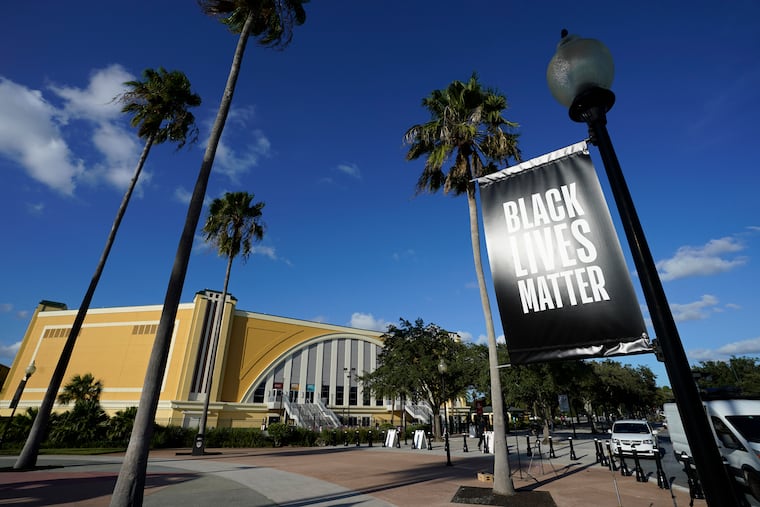Was last week’s NBA protest a ’strike,’ a ’boycott,’ or a ’walkout’? What you call it matters. | The Angry Grammarian
All of these words have deep histories that affect how virtuous you judge the actors to be, and whether you’re proud or annoyed about what they did.

As if on cue — to prove there’s no peaceful protest that people can’t get agitated about — last week’s decision by professional sports players to not play their scheduled games prompted word-choice consternation over what to call it.
A boycott? A strike? A postponement? Something else entirely?
After a police officer shot Jacob Blake in Kenosha, Wis., the Milwaukee Bucks launched a peaceful protest by refusing to play against the Orlando Magic. Other NBA teams, along with the WNBA, NHL, MLB, NFL, and MLS, followed in solidarity.
To illustrate the word-choice problem, witness the clumsiness of the first sentence of this column: “decision by professional sports players to not play their scheduled games” — one word would be better, no? And readers are curious: Lookups for boycott and strike on Merriam-Webster’s online dictionary spiked 2,800% last week. The Bucks and others called it a boycott, but Congresswoman Alexandra Ocasio-Cortez, among others, made a point of calling it a strike, not a boycott, to emphasize the players’ status as employees of their leagues.
» READ MORE: Historic NBA player boycott in wake of Jacob Blake shooting reinforces this: Black Lives Matter | Marcus Hayes
The difference matters as much as whether you refer to protesters or marchers or rioters. Each word choice reveals volumes about the speaker.
As Merriam-Webster points out, neither boycott nor strike does a great job of describing what happened. Strike doesn’t work because it’s used for protests in order to make demands of one’s employer; the athletes wanted change from elected officials, not from their own employers.
Boycott, on the other hand, doesn’t fit either, because its connotation is more external: Fans could boycott games by not attending them, but the word isn’t apt for those who work for the leagues themselves. The Oxford English Dictionary’s boycott definition fits a bit better: “to refuse to handle or buy (goods), or refuse to participate in (an event, meeting, etc.), as a protest.”
Postponement is too weak: Games get postponed for bad weather, not to protest police brutality.
Walkout is closest: Its second definition — “the action of leaving a meeting or organization as an expression of disapproval” — fits decently, insofar as a playoff game could be considered “a meeting” (with way less Zoom and way more sweat than most of my meetings). The OED generally agrees, calling a walkout “an act of leaving a meeting, performance, etc.., as a gesture of protest.” But all of its citations refer to nonparticipants (like audience members) walking out, not primary actors.
» READ MORE: NBA, players union to set up social justice coalition in response to protest
Why does all of this matter? Because all of these words have deep histories that affect how virtuous you judge the actors to be, and whether you’re proud or annoyed that you don’t get to watch your sportsball on a given day.
Is a strike a generally good thing? That depends on your opinion of labor unions, and opinions about labor unions fluctuate. (According to Gallup, last year labor unions had their second-highest approval ratings of the last half-century.) How about boycotts? Look at the BDS (boycott, divestment, sanctions) movement, aimed at Israel. A strong majority of Republicans oppose the BDS movement, while a plurality of Democrats support it. And over the years @realDonaldTrump has called for boycotts of CNN, Univision, HBO, Megyn Kelly, Harley-Davidson, the NFL, Apple, Rolling Stone, Glenfiddich Scotch, Mexico, Italy, and — in 14 different tweets — Macy’s. So are conservatives likely to favor a boycott over a strike?
When those same words are used for NBA playoff games, how you feel about the words describing the players’ actions is likely to influence how you feel about the actions themselves.
And how you feel about those actions — if they’re an appropriate protest of a worthy cause, or if, as Laura Ingraham says, LeBron James should “shut up and dribble” — says even more about you.
The Angry Grammarian, otherwise known as Jeffrey Barg, looks at how language, grammar, and punctuation shape our world, and appears biweekly. Send comments, questions and intransitive verbs to jeff@theangrygrammarian.com.